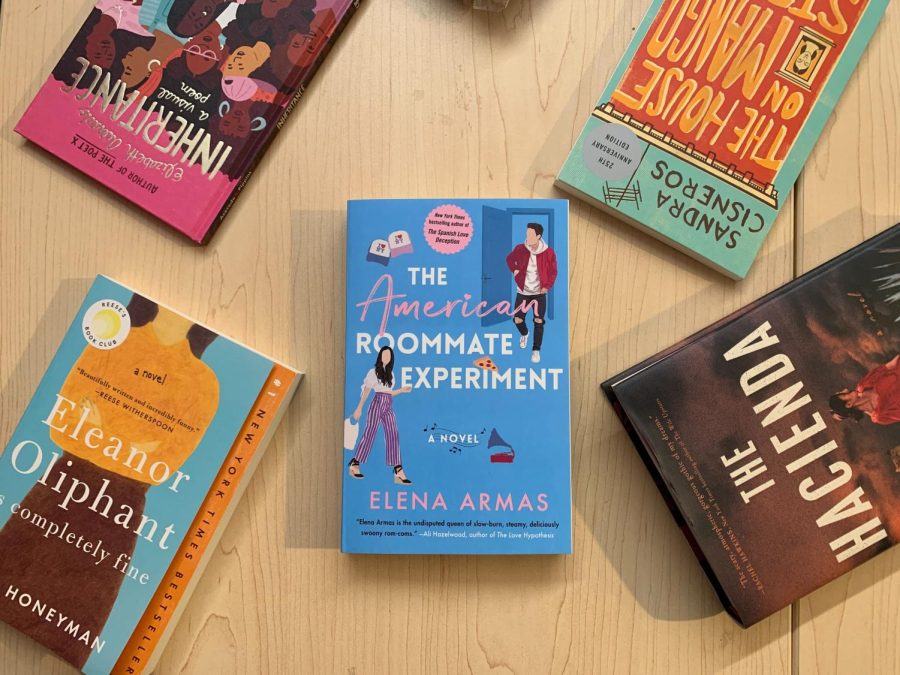Review: ‘The American Roommate Experiment’ yields mixed results
“The American Roommate Experiment” is author Elena Armas’ second novel. The novel follows protagonist Rosie as she navigates a relationship with a man she has been internet-stalking.
October 23, 2022
Ever had an internet crush? Something small and innocent on a celebrity, or a friend of a friend or a best friend’s cousin who’s a professional surfer that lives in Spain? Checking an Instagram profile turns into stalking Facebook, Twitter and maybe even LinkedIn (yes, LinkedIn can be surprisingly informative). Suddenly, you know everything about someone — their job, their hobbies, their goldendoodle’s name and age. But what happens when you meet a distant, if thorough, crush in real life?
Elena Armas’ sophomore novel, “The American Roommate Experiment,” follows a protagonist who does just that. Rosalyn Graham, or Rosie, is in a bit of a sticky situation. She has been Instagram stalking her best friend’s cousin Lucas Martín for quite some time. But little does she know he’s planned a visit and stay at his cousin’s. So when an accident with a collapsing ceiling leaves Rosie without a place to live, the pair become roommates in her best friend’s tiny studio apartment.
To make matters worse, Rosie just quit her job to pursue a career as a full-time romance writer, without her family’s knowledge, and now suffers from a massive writer’s block. So when Lucas gallantly offers himself as the subject of a dating experiment, with the goal of becoming her muse and helping her meet her deadlines, Rosie agrees — what does she really have to lose? Stuck under the same roof, Rosie is forced to face her demons and secrets, not to mention her crush.
“The American Roommate Experiment” is a mixing pot of tropes, including forced proximity, fake-dating and most prominently, insta-love. Readers know Rosie has had a crush on Lucas for a while, but it seems like it was love at first sight for him as well. While this trope may work for some books, the novel is 400 pages, and there’s only so much relationship development that can be done if two characters have already fallen for each other in the first 20 pages.
While Rosie and Lucas do not get together right away, the book follows the same push and pull between the characters without much variation. The book could have easily been 100 pages shorter had Armas varied the ways she built tension between Rosie and Lucas, rather than repeating the same inner monologue about how much Rosie wants Lucas, despite knowing she shouldn’t.
Repetition is a common ailment in the novel. Armas uses the same character reactions — “he smirked,” “he grinned” and “she blushed” — to the point of predictability. While these action cues help to establish the dynamic between the characters, after several “smirks,” “grins” and “blushes,” readers get the picture: he’s charming and she’s shy.
Down this road of predictability, Lucas becomes a typical swoon-worthy book boyfriend. While he has a somewhat complex backstory, complete with unresolved personal issues and overdue self growth, he reads like a cookie-cutter character. He feels one-dimensional and limited within the confines of simply being Rosie’s love interest. The same can be said for the secondary characters, such as Rosie’s brother, whose stint as a stripper feels like a feeble attempt at developing a deeper story. In reality, his unconventional gig serves as a cheap plot device, only tacked on to build unnecessary tension.
“The American Roommate Experiment” ticks all the necessary boxes for a romance novel, trope and plot-wise. Yet several aspects of the novel, including pacing, relationship development and second-hand embarrassment inducing moments (like saying “cronut you” instead of thank you) leave room for improvement. The novel may fall short of its predecessor, the “BookTok”-famous “The Spanish Love Deception,” but it still satisfies the cravings of a casual romance reader. “The American Roommate Experiment” is Armas’s bold second attempt at a slow-burn romance; readers can only hope that her next novel burns a little faster.
★★★☆☆







